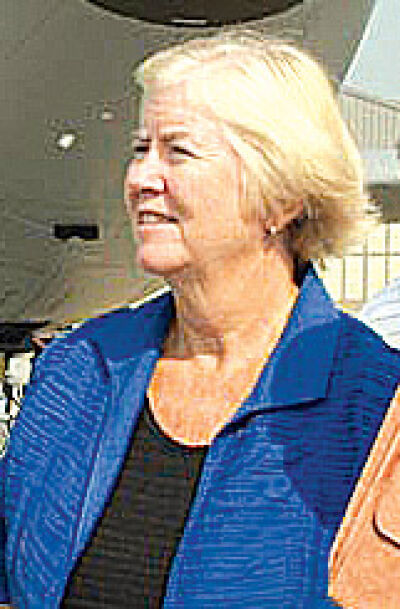METRO DETROIT — It has been more than seven years since Candice Miller left Lansing, but that does not mean she’s stopped following capitol politics. Macomb County’s Republican public works commissioner is undertaking an advocacy campaign against a package of bills that could place an extra cost on water customers throughout the state.
House Bills 5088, 5089, 5090, 5091, 5092 and 5093 — currently making their way through the Natural Resources, Environment, Tourism and Outdoor Recreation Committee — would create a statewide water payment assistance program funded through a monthly $2 fee on metered water bills.
But Miller sees a small problem: Water assistance programs already exist.
“From Macomb County’s perspective, we think it’s a duplicative fee because we already pay a portion of our water and sewer bills to a fund that we call the WRAP program,” Miller said.
The Water Residential Assistance Program helps Great Lakes Water Authority customers pay water bills using funds generated from customers in the same community. Any WRAP funds collected but not used are circulated to help customers throughout the GLWA system. The GLWA funds WRAP through a 0.5% fee and provides over $4.4 million in assistance funds.
Combining the existing GLWA program with the fact that three of the four representatives introducing bills in this package have districts in Detroit, Miller sees the bills and its program as a way to subsidize Detroit’s own water assistance program through taxes across the state.
“Most of it is going to go to Detroit because about a year or so ago, Detroit started a program to give out free water or water assistance,” Miller said.
The Detroit Water and Sewerage Department’s Lifeline Plan has used over $40 million in one-time federal funds to support qualifying residents. The program’s enrollment is expected to reach 40,000 residents by the end of 2024 and Miller believes the bill package is intended to supplement the program once the federal funds are spent.
“They’re running out of money,” Miller said. “They need a revenue source, and this is what they’ve come up with.”
Since making this realization, Miller has embarked on a countywide and regionwide campaign against the proposed bills by urging communities to pass resolutions opposing the package. Communities in Macomb County that have adopted resolutions range from Macomb Township to Mount Clemens, Clinton Township to St. Clair Shores and Sterling Heights to New Haven, while Miller expects other county communities and the Macomb County Board of Commissioners to discuss the bills.
“There are so many communities that have passed resolutions opposing it and many more to follow,” Miller said. “We live in a democracy. This is how you make your voices heard. In such a partisan environment, to see all of these communities — Democrats and Republicans — all voting unanimously, that is quite a statement.”
State Sen. Stephanie Chang, D-Detroit, whose district covers parts of Detroit, Oakland County and Macomb County, disagrees with Miller’s views on the bill package and the state of water assistance programs.
“There is a report that U of M and MSU and others have put together showing that (water affordability) is a statewide problem,” Chang said. “We also know that, from data during COVID, that there are a lot of low-income households across the whole state and that there are a lot of water providers that have had to increase rates.”
Chang believes Detroit would be a contributor to the program and not its primary beneficiary, having already knocked off many outstanding bills through the city’s Lifeline program. The statewide water program would support the DWSD’s Lifeline Plan, but also WRAP.
“Lifeline and WRAP have been very successful so far, but what we’re finding is that the need is just so great and through our bills it will help not just Detroiters but everyone in this area and across the entire state to get water bills they can afford,” Chang said. “We know that everyone needs water to live, and a lot of families are struggling to pay their bills right now. We definitely anticipate this will help so many families, hundreds of thousands of families across the state, and that is going to require funding.”
The bills will allow water providers to use the funds to either support existing programs or create new ones.
“We imagine most will probably be part of the statewide program through the MDHHS (Michigan Department of Health and Human Services), but WRAP and Lifeline will be able to continue,” Chang said. “The thought is that this will supplement what they are doing and ensure the longevity and sustainability of them, which is why we see such strong support for these bills from GLWA and Detroit and all the folks that are benefiting from this program.”
While Miller has focused on building opposition in the suburbs — she has reached out to communities in Oakland and western Wayne County as well — Michigan House District 61 Rep. Denise Mentzer, D-Mount Clemens, says the legislature’s partisan divide, combined with the tri-county opposition, presents a massive hurdle for the package to face as it is.
“With the 54-54 split, in order for the vote to pass you’re going to have to find some Republican support,” Mentzer said. “I don’t know that we’ll find much Republican support with this kind of a split.”
The package is currently still in committee, where Mentzer expects changes will be made to it.
“When you send something to committee, changes come,” Mentzer said. “You want changes. The lobbyists want changes. The union wants changes. An affected business or organization wants changes. I never count on the bill as it’s written before it comes out of committee. I wait to see what the changes are going to be.”
Mentzer would not speculate on whether the package would die in committee or make it onto Gov. Gretchen Whitmer’s desk in some form, but said she would like to see a version of the bill that allows for communities to opt in to the program and keep generated funds in the communities it is collected from.
“My hope is that it doesn’t look like the bill(s) we have right now so that she can sign it,” Mentzer said.
Chang says changes are constantly being made to the bills, which already took nine months to draft before being introduced, and that bipartisan support may be easier — and more natural — than expected.
“Water has been a really great bipartisan issue for this legislature to tackle over the past three to four years,” Chang said. “We had a bipartisan water infrastructure bill. We had bipartisan support for a water shut-off moratorium during COVID. We have appropriated money for water shut-off prevention. We’ve just done so many good things in a bipartisan way. I’m talking to Republican colleagues on a fairly frequent basis to check in with them about this, and the thing is there are a lot of folks who recognize they have low-income families in rural areas and suburban areas and urban areas. It’s just really everywhere and we’re positioned as the Great Lakes State to be a leader in helping all of our families.”
The bill package itself has origins in the bipartisan Legislature, its drafters having used the 2021 Michigan Energy Assistance Program as its model for funding. The MEAP helps low-income Michiganders cover energy bills and is funded by a $1 monthly fee on electric bills. The proposed $2 monthly fee is also believed to sit well with Michiganders, with Chang pointing to a 2023 Marketing Resource Group poll where 60% of respondents approved of the fee while 31% disapproved.
“We already have a similar funding mechanism for energy bills,” Chang said. “It makes sense to do the same thing for water.”
 Publication select ▼
Publication select ▼






























